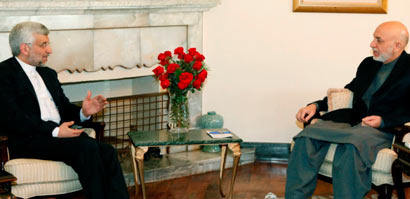Afghanistan’s Historical “No” to Extra-Regional Forces

What has secretary of Iran's National Security Council Mr. Jalili’s agenda been on his trip to India and Afghanistan?
I have no information about the agenda and objectives of his visit. But the fact that Iranian officials visit Kabul at this level is very significant, especially considering that Mr. Jalili met with the Indian officials prior to his trip to Afghanistan. Considering Iran and India's strategy with regard to the issue of Afghanistan, it seems that such visits can create more coordination, particularly that, based on some reports, there is a possibility of holding a trilateral summit between Iran, India, and Afghanistan in the future. Thus, considering the form of relations between Iran and Afghanistan and the commonalities between them, such visits are beneficial both from an economic and from a political point of view. Prior to this trip, the Paris Conference was held with no particular results, and later, the head of the Afghan government will visit Washington.
As you mentioned, Mr. Karzai is supposed to visit the US. Does Iran have any plan to influence Afghanistan's position with regard to the presence of US forces in this country?
What is certain is that in visits like Mr. Jalili's, all issues are discussed. Since development and security are Tehran's strategic goals, all issues have also naturally been discussed in this trip. But with regard to the long-term presence of extra-regional forces, including American forces, no particular agenda has, hitherto, been determined, except negotiations at the level of bureau heads and ambassadors which have been held in Washington in recent months. But no decision has, so far, been made in this regard.
In general, my perception of Iran's view regarding the presence of foreign forces in Afghanistan is that neither was the Red Army able to improve the situation in Afghanistan in the past and during the former Soviet Union era, nor has the presence of extra-regional forces created better conditions for this country in the last decade. Therefore, if in the future any decision will be made in favor of the presence of extra-regional forces in Afghanistan, the situation in this country will become more complicated.
This visit was made while recent negotiations between the Afghan government and the Taliban in Paris were not fruitful. Does Iran seek to affect Karzai's decision in relation with peace negotiations?
As I pointed out earlier, my perception of Iran's view of Afghanistan is based on the strategy which has been pursued during the past three decades and that is security and development. Any measure that would enhance security and development in Afghanistan would principally be approved by Tehran. But regarding meetings like the one held in Paris, it is basically not clear with what objectives and with what agenda they are held. That is why it had no clear outcome either. Iran has supported any measure which has been based on Afghan solutions and approved by the international community especially the UN. But today's conditions in Afghanistan are different from the past because now this country has a constitution and different administrative bodies. One question which arises is what is the position of the Afghan parliaments and people's representatives in such talks? Were those who participated in this conference acting as representatives of the people or were they present in a personal capacity? These issues are not clear. It seems that not only Tehran, but other countries as well are concerned about who is directing this matter.
Are there any conditions that would make talks between the government of Afghanistan and the Taliban acceptable to Tehran?
What has so far happened and what is agreed upon by most experts is that basically whatever acts of violence this radical movement has committed, it has been rewarded for it; the government's behavior is at the least not an exception to this rule. Despite the fact that there was an unsuccessful assassination attempt against the highest Afghan security official and there are still no news of his health, the government of Afghanistan dispatched its representatives to the Paris Conference. This means that whenever the Taliban has resorted to violence, it has been rewarded. The same issue can be seen in the freedom of prisoners.
It seems that if this trend is not based on a specific agenda and the Afghan parliament at least makes no decision on this issue, and on the other side if the radical movement does not state its position with regard to the constitution, these types of conferences will either have no outcome or they will be to the benefit of certain countries. Some analysts believe that the Paris Conference was to the benefit and in the interests of those countries which intend to withdraw their forces from Afghanistan. It means that they intend to show the people that the trend of peace negotiations is ongoing and that is why they are bringing their forces out of Afghanistan.
Less than a year remains till the presidential election in Afghanistan. Does Tehran have any clear opinion about the political future of this country?
As I said, any event leading to the development and security of Afghanistan is supported by Iran, and any event which is not aimed at this objective is a matter of concern for Tehran. The second presidential election in Afghanistan was faced with some problems and there was a run-off election and due to the protest of one of the major candidates who had gone to the second round, the election was not held. Nevertheless, the election was not a just and free one. This issue prevented the winner of the election from succeeding in improving the situation in Afghanistan.
What Iran wants to see in Afghanistan is a free and just election, so that its outcome would help in improving the situation in Afghanistan and not further complicate matters in this country.

